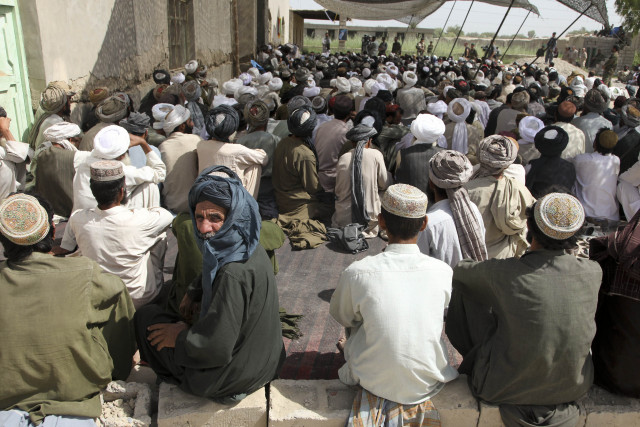Taliban 'most likely' to reach consensus on new leader today
Mullah Yakoub and Sirajuddin Haqqani have backed out of the race citing personal reasons, reports suggest

Local Afghan men attend a shura in the Nawa District, Helmand Province, Afghanistan on July 23, 2009.
PHOTO: USMC
Taliban officials familiar with the consultation process say the election of the new leader took some time as the leadership council's members could not gather at one place owing to security reasons.
Who will succeed Mullah Mansoor?
“Those members who cannot attend the meeting are suggesting names through other channels. A final decision can be taken today and the new leader can be formally announced in a couple of days,” a Taliban member said.
Senior Taliban leaders have also been tasked to seek opinion of guerilla leaders who are not members of the ‘Shura’ to create a broad-based consensus on the name of Mullah Akhtar Mansour’s successor. However, the Taliban have not yet formally confirmed the death of Mullah Akhtar Mansour.
“Taliban leaders are very cautious this time to avoid a controversy similar to that surrounding Mansour’s election. I was among the nearly 50 Taliban who have been contacted to share my opinion as to who should be the new chief,” another Taliban leader said.
Maulvi Haibatullah, one of the deputies to Akhtar Mansour, is supervising the consultation process while senior leaders, Maulvi Hedayatullah, known as Maulvi Gul Agha, former ministers Maulvi Noorud Turabi, Amir Khan Mutaqi, and Maulvi Mutiullah, known as Mullah Nana, are members of the consultation team.
Unclear whether Mullah Mansour was killed in Pakistan or Afghanistan: US
Mullah Yaqoob, the elder son of Mullah Omar, is emerging as the 'most likely' choice for the highest position as he presently enjoys more support, according to some Taliban leaders. Yaqoob, who is less than 30 years, is presently looking after the military affairs in 15 of Afghanistan’s 34 provinces. He was given this important position in April. He was also formally inducted to the leadership council along with his uncle Mullah Abdul Manan Omari.
“At a recent meeting, senior Taliban leaders and close aides of Mullah Omar, compared the leadership quality of his father with Mullah Yaqoob in an indication to prepare him for the new role,” a Taliban leader, who was familiar with the meeting told The Express Tribune.
Siraj-ud-Haqqani, known as Khalifa among the Taliban, is also a likely candidate. But some Taliban leaders feel that Kandahari Taliban may resist his election as Mullah Omar had launched the movement in Kandahar in early 90s. Majority of the Taliban founding members, including Mullah Omar and Mansoor, belonged to Kandahar. Later people from other areas joined the Taliban. The impression about the Haqqani Network at international level will also force the Taliban leaders to think many time before endorsing Haqqani for the top slot.
Meanwhile, reports suggest that the two main contenders have backed out of the leadership race.
"Mullah Yakoub has refused to accept the role, saying he is too young for it," a senior Taliban source told AFP.
"Mansour's deputy and operational head of the Haqqani network, Sirajuddin Haqqani, has also refused due to personal reasons," he added.
Many top commanders refused to pledge allegiance to Mansour, saying the process to select him was rushed and biased as they accused him of keeping founder Mullah Omar's death secret for two years.
"The Taliban movement is passing through a very crucial stage. We need a conciliator not a warrior to take his place," one of the Taliban sources said, citing some of the commanders at the supreme council meetings.
The Taliban insiders say even if Khalifa was not chosen, he would enjoy most powers like he has over the past few months even when Mansoor was alive.
Frequent traveler Mullah Mansour used Pakistan airports
Mullah Abdul Ghani Baradar, one of the deputies to Mullah Omar, is also being considered to head the movement. Baradar had been captured in a joint Pakistan-US raid near Karachi in 2010 is still in detention with Pakistani security officials. A Taliban delegation from the Qatar office that recently visited Pakistan failed to convince Pakistani authorities to set him free as he is considered as a "US detainee in Pakistan,"
Maulvi Haibatullah, the second deputy in the Taliban hierarchy, is also under discussion as he is widely respected for being a religious scholar and teacher to most of the Taliban. He had run a “madrassa” during the Taliban regime.
Another opinion:
The Taliban leaders also considering an option to appoint a 'less-known' leader as the new head to reduce possible threats to his life. The US drone campaign would remain a threat to the Taliban leaders and this situation could affect activities of the leaders. However, some believe the appointment of an unknown person could lead to differences.



















COMMENTS
Comments are moderated and generally will be posted if they are on-topic and not abusive.
For more information, please see our Comments FAQ